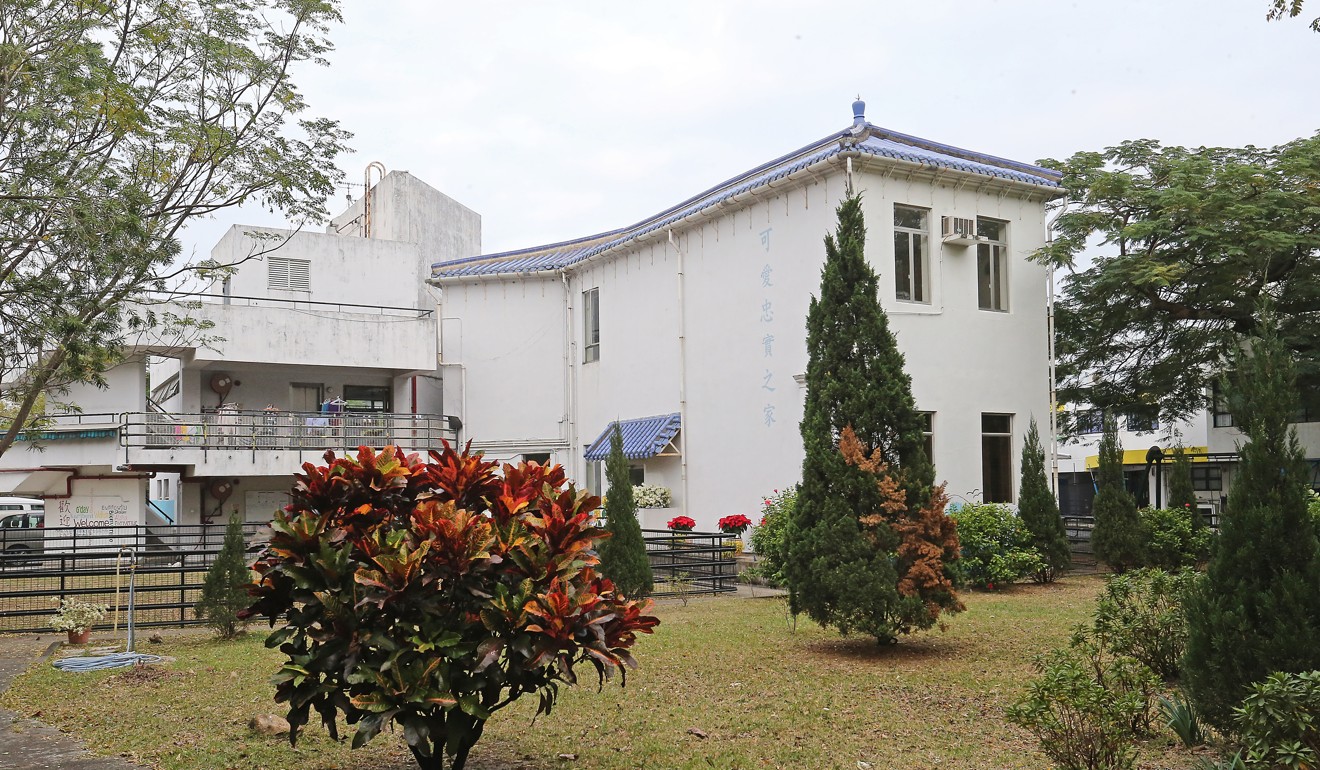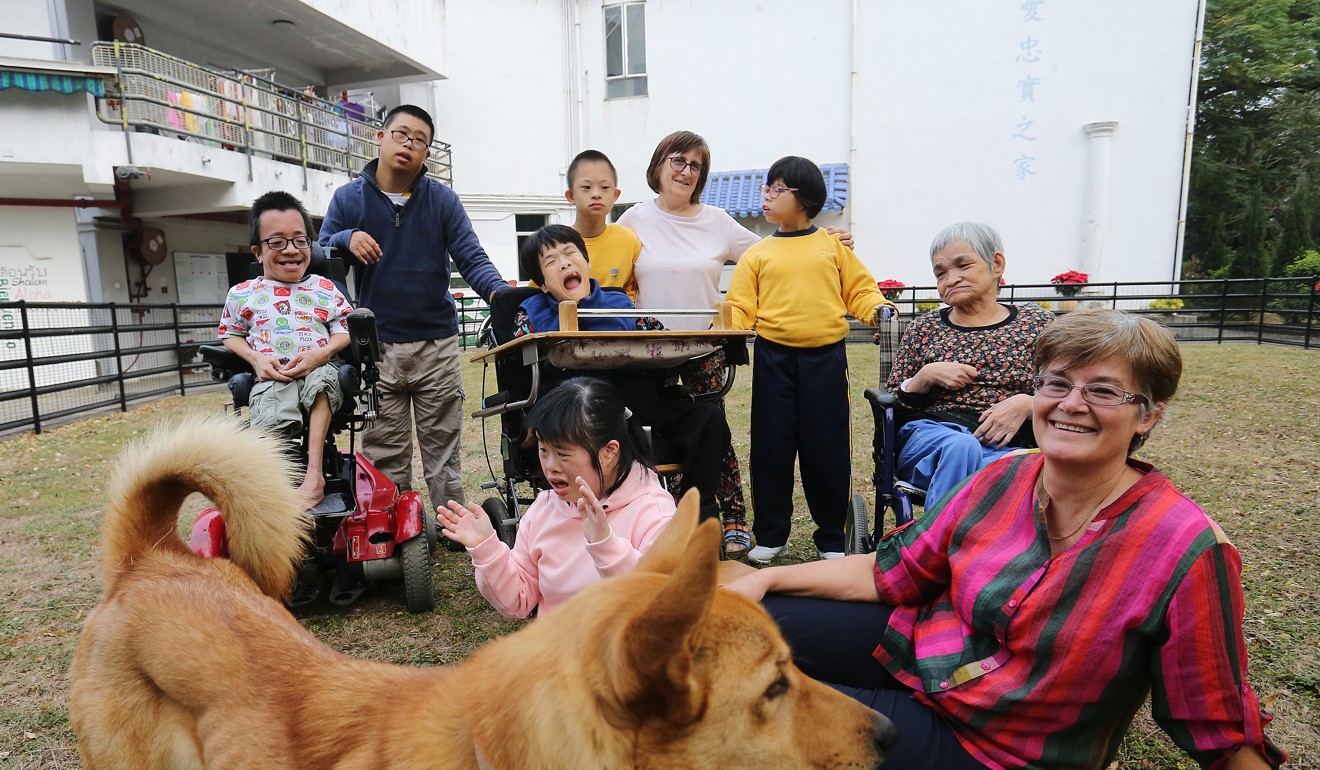
Who’s the full-time volunteer running a Hong Kong disabled care centre that needs HK$6 million to survive?
Priding itself on having ‘no boundaries from birth to death’, the 52-year-old community has its eye on expansion
Full-time volunteer Tracy Pattrick is upholding a 52-year-old legacy of Christian care for the disabled in Hong Kong by managing a unique organisation in the northern New Territories.
Established by two British Christian missionaries in 1965, the Home of Loving Faithfulness in Kwu Tung has grown from accommodating only 10 children to 16 full-time residents whose ages range from 18 months to 65 years old. Their ranks include a 56-year-old man who has lived at the centre since its launch.
“The premise was to take everyone in,” Pattrick says of the vision of co-founders Wendy Blackmur and Valerie Conibear. “We have no boundaries from birth to death.”

Some members of the family, as Pattrick refers to the resident community, have multiple physical and mental disabilities and need round-the-clock care. The home employs four full-time nurses, and has an additional 22 staff members and volunteers.
Disabled residents are admitted for care that is provided completely free of charge, relieving parents and relatives of the financial burden of private nursing or expensive equipment.
“We need over HK$6 million to survive, which is a huge amount of money,” Pattrick says. “We’re not funded by the government at all, so we live totally by faith. Of course we welcome any donations, but we believe in a Christian God who is the source of our income.”
According to Pattrick, the centre plans to expand the number of family-style units on its 1.25-acre site over the next three to four years. It aims to eventually house up to 40 residents.
Hong Kong charity’s home-based services help elderly and disabled take care of themselves
The centre is split into areas for highly dependent residents who need extensive physical care, and family-style units with shared kitchens and bathrooms for the more able-bodied residents.
“As a family, you work together, you cook together, you live together, you play together. That’s what we try to build,” she says. “Each of our family needs that, and they can support one another.”
This attitude makes the centre feel incredibly welcoming to visitors and residents alike, Pattrick says.
She maintains an open-door policy for members of the public to come and visit, enabling them to see where their money is being spent.
Chinese man carries his disabled wife up sacred mountain so she can realise her dream
“Our family just loves people,” she says. “You’ll make them smile, giggle and laugh. There are different people that come through the home and give in so many ways.
“We have people who’ll give HK$50 even if they have nothing, whereas others give huge amounts of money or even just a bag of rice. Everything we get is appreciated.”
Pattrick first started working with the home in 1996 after qualifying as an occupational therapist, but she was initially put off by the idea of coming to Hong Kong.

“I was used to game parks and wide beaches,” she says of her native Kenya. “The idea of living in a huge mass of high-rise buildings was the last thing I wanted to do!”
“But when I finally came in 1996, I was bowled over. I loved the people, the place, the work. And then I fell in love with my son Matthew, who I went on to adopt.”
Pattrick met Matthew at the centre when he was only a toddler. Matthew has a rare condition called osteogenesis imperfecta, or brittle bone disease. Signs were hung around his cot warning others not to touch him due to the high risk of accidentally breaking his bones.
He’s a huge ambassador for people with disabilities because he really speaks up
But Pattrick fell in love at once with Matthew’s cheerful personality, and would regularly cuddle and play with him.
“He’s an incredible inspiration to so many people,” the proud mother says. “He’s so positive despite everything. He’s a huge ambassador for people with disabilities because he really speaks up.”
Pattrick and Matthew, in addition to the rest of the centre’s staff, often have to work gruelling hours when they are sometimes short on manpower.
“We bathe everybody every day, and 11 of our residents are highly dependent,” she says.
“Our staff and the nurses do an incredible job of keeping everyone fit and healthy. If we’re short on staff you just have to push through. Some do 12-hour days or longer.”
The disabled Chinese man who battled to graduate from Harvard University faces new fight for job
Despite the occasional struggles, Pattrick remains optimistic about the centre’s future, convinced that attitudes towards disabled people are changing for the better in Hong Kong and beyond.
“Hong Kong is actually quite pioneering now with respect to disabled people,” she says.
“Medicine, a number of organisations, hospitals and physio centres are doing so much in caring for disabled people. Hong Kong is also beginning to make new buildings more wheelchair accessible.”
But she stresses that space is the “most difficult” issue that parents and carers of the disabled face locally, especially when specialist equipment is bulky.
New Hong Kong minibuses will cater for the elderly, disabled
She notes that Matthew, whom she describes as the size of a six-year-old boy, has equipment that can “fill a whole room”.
Overall, Pattrick’s mission is to ensure that the disabled have a voice in society, and retain the right to be treated with dignity and compassion.
“Even if they don’t actually have a physical voice, they need somebody to be that voice for them,” she says.
“I want to be the person who speaks up and says: ‘This person was born and bred in Hong Kong, she has a right to decide what she wants for her life, how she lives it, and has access to that.’”

